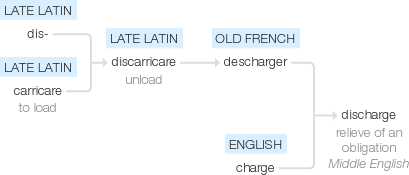Discharge
Middle English (in the sense ‘relieve of an obligation’): from Old French descharger, from late Latin discarricare ‘unload’, from dis- (expressing reversal) + carricare ‘to load’ (see charge).
wiktionary
From Middle English dischargen, from Anglo-Norman descharger and Old French deschargier(“to unload”), from Late Latin discarricō(“I unload”), equivalent to dis- + charge.
etymonline
discharge (v.)
early 14c., "to exempt, exonerate, release, free (from an obligation)," from Old French deschargier "to unload, discharge" (12c., Modern French décharger), from Late Latin discarricare, from dis- "do the opposite of" (see dis-) + carricare "to load a wagon or cart," from Latin carrus "two-wheeled wagon" (see car).
Meaning "to fulfill, to perform (one's duties, etc.)" is from c. 1400. Sense of "dismiss from office or employment" is from c. 1400. Meaning "to unload, to free from, disburden" is late 14c. Of weapons, "send forth by propulsion," transitive, 1550s; "to fire off," intransitive, 1580s. Of a river, "to empty itself," c. 1600. The electrical sense is first attested 1748. Related: Discharged; discharging.
discharge (n.)
late 14c., "relief from misfortune," see discharge (v.). Meaning "release from work or duty" is from early 15c. Meaning "act of sending out or pouring forth" is from c. 1600; sense of "that which is emitted or poured forth" is from 1727. Meaning "action of firing off a firearm or other missile weapon" is from 1590s. Electricity sense is from 1794.
